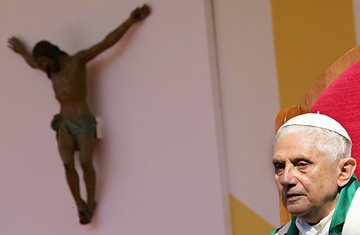
Pope Benedict XVI concentrates on the altar in Velletri, Italy.
It's been nearly two decades since the defeat of the Communist atheist-materialism that had long been Public Enemy No. 1 in the eyes of the Catholic Church. But if Pope Benedict XVI's latest encyclical, "Spe Salvi," is any indication, the spirit of Karl Marx is still alive and well in the halls of the Vatican.
Defeated, Marxism is no longer the incarnation of evil in our midst, but rather the perfect (vanquished) foil in Benedict's ongoing intellectually driven sermon that Christian faith is history's only true answer. But the Pope is not ready to declare victory. The Church's current foe, as he sees it, is still in the heart of Europe and still atheist in nature: a sort of post-Socialist, anything-goes brand of Utopia that Benedict calls "relativism" — and disparages as the root of everything from loose sexual mores to a breakdown of the traditional family to runaway capitalism.
Benedict traces relativism back to 16th-century English philosopher Francis Bacon and his godless idea of "faith in progress." In Benedict's reading of history, the Enlightenment and the French Revolution that followed paved the way for Marx; his ideology may have eventually been discarded but his influence still lingers in modernitys false hope of life without suffering. "We can try to limit suffering, to fight against it, but we cannot eliminate it," Benedict writes. "It is when we attempt to avoid suffering by withdrawing from anything that might involve hurt, when we try to spare ourselves the effort and pain of pursuing truth, love, and goodness, that we drift into a life of emptiness, in which there may be almost no pain, but the dark sensation of meaninglessness and abandonment is all the greater." In other words, the fall of Communism again proves that human salvation lies in the Gospel alone.
About midway through his sharply written and widely referenced 73-page encyclical released on Friday, Benedict takes his first shots at Marxism (he has attacked it before, in his first encyclical written in December 2005), which he argues was doomed from the moment it triumphed in Russia in 1917. "Together with the victory of the revolution, Marx's fundamental error also became evident. He showed precisely how to overthrow the existing order, but he did not say how matters should proceed thereafter. He simply presumed that with the expropriation of the ruling class, with the fall of political power and the socialization of means of production, the new Jerusalem would be realized."
Benedict argues that Marx was flawed, above all, because he misunderstood the human condition. "He forgot that man always remains man. He forgot man and he forgot man's freedom. He forgot that freedom always remains also freedom for evil. He thought that once the economy had been put right, everything would automatically be put right. His real error is materialism: man, in fact, is not merely the product of economic conditions, and it is not possible to redeem him purely from the outside by creating a favorable economic environment."
Still, even while expounding on the shortcomings of Marx's theories, Benedict goes out of his way to laud the philosopher for his "incisive language and intellect... precision and great analytic skill." Indeed it may be the final nail in the coffin for Communist ideology that the head of the Catholic Church feels safe in giving Marx his props as a great thinker. Swiss-born Cardinal George Cottier, a prominent Vatican theologian, who presented the encyclical to the Rome press corps, smiled as one reporter asked about the kind words. "Yes, I was surprised by the Holy Father's almost praise for Marx," he said. "I said almost praise."
It has become apparent since his election in April 2005 that this Pope, whether or not one agrees with him, stands out for his intellectual honesty and linguistic clarity. He believes what he says, and says what he believes in terms that are simple but thought-provoking. In this latest document, he uses Marxism — though no longer a clear and present danger to Catholic faith — as a warning against the rampant growth of reason, science and freedom without a commensurate growth of faith and morals. "The ambiguity of progress becomes evident. Without doubt, it offers new possibilities for good, but it also opens up appalling possibilities for evil — possibilities that formerly did not exist," Benedict writes. "We have all witnessed the way in which progress, in the wrong hands, can become and has indeed become a terrifying progress in evil. If technical progress is not matched by corresponding progress in man's ethical formation, in man's inner growth then it is not progress at all, but a threat for man and for the world."
Cottier insists that this "is not an 'anti-encyclical.'" The papal letter is mostly about Christian hope, and in it, Benedict refers to the lives and ideas of various saints and martyrs to explain that hope: Most of all, Benedict leans on the teachings of St. Augustine, the Pope's personal intellectual and spiritual guide, to illuminate "all the contradictions and hopes" of human existence. "In some way we want life itself, true life, untouched even by death; yet at the same time we do not know the thing towards which we feel driven," the Pope writes. "This unknown 'thing' is the true 'hope' which drives us." But this eminently cerebral Pope makes clear that his vision of the Christian message is much more than an intellectual exercise. "The Gospel is not merely a communication of things that can be known — it is one that makes things happen and is life-changing. The dark door of time, of the future, has been thrown open."
Benedict's message of old-fashioned faith in the modern world is itself a call to revolution — or counter-revolution. Only time will tell how many respond to the call.
